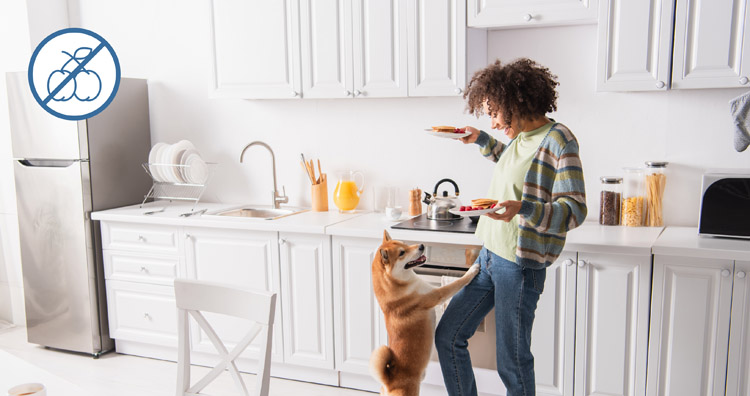- Nutrition
- 2023
Fruit and vegetables that dogs cannot eat and why
Rewarding your dog with fruit or vegetables occasionally is fine, but not all of them are good for him. We tell you which he mustn’t be allowed to eat and why.
You want the best loved member of your family to be healthy and, also, happy. To keep him happy, in addition to caring for him with natural, balanced and nutritious food, you probably sometimes allow him an extra treat. And this is where you come to the problem, because you ask yourself: “what can I give him?” There are foods that can be damaging to his health for a very simple reason: the dog’s digestive system is different from ours. Their intestines are shorter and a great many of the foods that we eat are too fatty, too rich or toxic to their organisms and difficult to digest.
==Carrot, pumpkin, apple, pear, cucumber and mango are part of a long list of fruit and vegetables that a dog can eat. They are beneficial to him provided that they are free of seeds, in small portions and without overdoing it, since many of them contain a lot of sugar. Cranberries and strawberries are also good. Red fruits contain minerals and antioxidants that prevent the ageing of cells. However, woodland red berries are not recommended for our four-footed friends.
Cherries are toxic

There is one specific type of red fruit that should never be offered to our dog: cherries. Perhaps you didn’t know that cherry stones contain cyanide. This is a poison that prevents blood cells from obtaining the oxygen they need to carry out their function. As a result, eating cherries with stones will cause dilatation of the pupils, reddening of the gums and difficulty in breathing.
No grapes or raisins. They can cause kidney failure
This is probably the most damaging fruit there is for a dog. Grapes and raisins, raw, cooked or concealed in bread or cake, can be lethal. Even in very small quantities. Although affecting all dogs, whatever breed, size or age, some are more sensitive to them than others. In the worst case, grapes or raisins can result in kidney failure. It is surprising that the specific mechanism is still not known, although it is believed that there may be some toxin contained in this fruit.
Limes and lemons, too much citric acid
Lemon and lime are not considered to be toxic fruits for a dog. Even so, it is best to avoid them as they contain high levels of citric acids which can cause gastrointestinal problems such as diarrhoea and vomiting. In extreme cases they can also affect the nervous system.
Garlic, onions and other alliums
The smell and flavour of garlic and onion is not something that is going to entrance your dog, but even so it is best to keep them out of his reach. Also the rest of that family: spring onions, chives, leeks and shallots. They are a danger because they contain a sulphur compound that is toxic to dogs. It affects their red corpuscles and can cause anaemia and weakness. With regard to breeds, they are all very susceptible to this substance, but especially Japanese breeds such as the Akita and Shiba Inu.

Green tomatoes, seeds and plant, damage his stomach
If it is red, very ripe and you remove all the seeds, the tomato is not a toxic vegetable to a dog. However, the tomato plant is because it contains a toxic substance called solanine. A dog would have to eat a lot of it to make himself ill, but why take the risk? Also green tomatoes contain a chemical substance called glycoalkaloid which can cause serious digestive problems for a dog. The same thing happens with red tomatoes that are not truly ripe and, as a consequence, still have some green parts. So as not to run risks, the experts recommend avoiding dried tomatoes and any foods that involve tomato sauce.
Avocado: it’s an insane choice for a dog
In recent years, the consumption of avocados in Spain has risen because they have a lot of properties that are beneficial to human health. It could be said that the avocado has become a fashionable breakfast among gourmets. However, it is a food that is considered potentially damaging for dogs. Avocados contain persin, which is a fungicidal toxin. It is found in high concentrations in the leaves, the stone and the skin of the fruit, but is also present in a lower proportion in the pulp. It could cause vomiting and diarrhoea in your dog.
What about nuts? Macadamia nuts, never
In general, dogs do not digest raw nuts easily and there is a potential risk of choking, above all if a bit of the shell has got stuck. It is known that macadamia nuts in particular are very toxic, although the cause is still unknown. They produce depression, weakness (especially in the back legs), vomiting and trembling.
Care with pips and stones
Dogs can enjoy many other fruits which carry no risk to their health such as, for example, apples and pears, but always provided they have been cored to remove the seeds. If you are not sure, it is better to avoid them.
In caring for the health of your best friend it is advisable, also, to remember that it is not only he that needs training, but also your family and friends. It is normal for them to want to offer your dog little treats to win his sympathy and confidence. It is not difficult to make sure that they know what your dog can eat and what he can’t. Or, at least, that they get used to asking you always before offering your dog anything to eat.
In any case, if you are in any doubt, you can consult the list of plants toxic to dogs prepared by the American Society for the Prevention of Cruelty to Animals (ACPCA) https://www.aspca.org/pet-care/animal-poison-control/dogs-plant-list (Sociedad Americana para la Prevention de la Crueldad hacia los Animales, in Spanish).